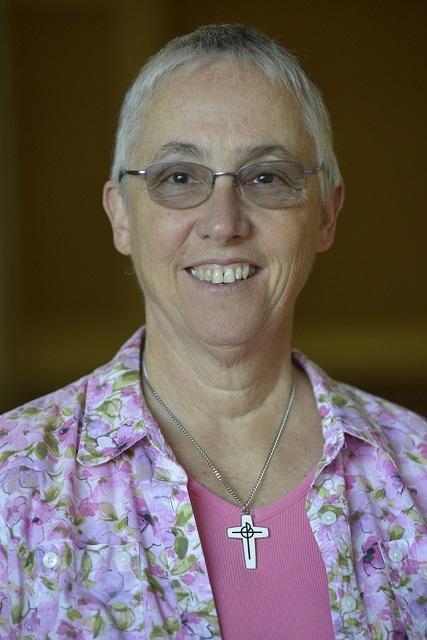Barbara Battista’s path seemed clear. She had completed her degree at Butler University and was working full-time as a pharmacist, like her father and her aunt before her. She had settled into a professional, largely non-religious, life in her hometown of Indianapolis.
But after her younger brother died tragically in a work-related accident, Battista began to rethink things. She became more engaged in her church. Then she accepted an invitation to visit the home of the Sisters of Providence congregation at St. Mary-of-the-Woods in western Indiana. After months of prayer and contemplation—and a few difficult conversations with her family—Battista entered the congregation. She took her first vows three years later.
Sister Barbara’s experiences in healthcare were set to change, too. “When I entered religious life, I realized that it was my task to try as much as I could to live the lessons of the Gospels and to follow Jesus’ example,” she says. “To me, that meant seeking a more direct relationship with those I cared for. When I learned about the physician assistant profession, I thought, ‘Wow, this is how I can be of service.’”

After her PA training, Sister Barbara would go on to care for a wide range of patients, many of them low-income persons. At different stages of her career, she treated patients with prenatal needs, cancer, and workplace injuries. She saw those patients in Chicago, West Virginia, and Terre Haute, Indiana, as well as in short-term settings outside the country and in post-Katrina New Orleans.
Along the way, Sister Barbara witnessed first-hand how lives were damaged due to inability to afford preventative care, along with medicines for diabetes, hypertension, and other chronic illnesses. “Twenty years ago, we saw plenty of uninsured patients who struggled, but those who had a job with insurance were able to afford care,” she says. “Now, so many people work but can’t afford the premiums for the insurance through their employment, or they can’t afford to pay out of pocket until they meet a big deductible.”
The problem extends far beyond Sister Barbara’s patients, of course. The average U.S. health insurance deductible has more than tripled since 2006, now averaging $1,300 each year, a cost outside the reach of families straining to make the next rent or utility payment. “Our system is so broken,” Sister Barbara says. “Even when it comes to healthcare, there are haves and have-nots. And that is a glaring sign that we are not coming together as a human community.”
"Healthcare is a right, not a privilege"
To Sister Barbara, the prescription to remedy this systemic problem is as clear as the diagnosis. “Healthcare is a right, not a privilege. And that includes access to mental healthcare, preventive medicine, and even things like nutritious foods,” she says. “Obamacare was certainly an improvement. But we need to move to Medicare for All as soon as possible. And I believe that persons of faith need to examine how we can make that happen.”
If that statement sounds like advocacy, it certainly is. Sister Barbara has reduced her patient time in order to devote more hours to her role coordinating the social justice outreach of the Sisters of Providence. Under the enviable title of Justice Promoter, she lifts up issues like climate change and criminal justice reform. But healthcare will always be a priority topic for her.
And Sister Barbara’s healthcare advocacy has a far broader focus than some may expect. “In the Catholic tradition, so many of us see abortion as the healthcare issue we vote on. But I don’t think that is consistent with our faith’s teachings,” she says. “There is far more to the dignity of life, and that certainly includes the dignity of life for those who struggle to get healthcare.”
After more than three decades of hands-on experience in healthcare, most of it while serving as a Sister of Providence, Sister Barbara can attest to the deep connection between faith traditions and caring for the needs of those who struggle. “I believe that when we look at Jesus’ life and the Gospel stories, the clear message is that all persons deserve both mercy and respect.” she says. “That means that people of faith are called to ensure we have a healthcare system that is built on a foundation of justice.”
To learn more about the Sisters of Providence and their work for social justice, click here.
Faith and Healthcare Notes
Healthcare Profiteering, Part One. The Health and Human Services’ Office of Inspector General has found that private Medicare Advantage insurers have been combing patients' medical charts to look for indications of serious illnesses that would justify higher payments from the government, even though those payments were not justified by the patient's face-of-face visit with a clinician. This trick increased the private companies’ payments by an estimated $6.7 billion in 2017.
Healthcare Profiteering, Part Two. Under the headline, “In the U.S., an Angioplasty Costs $32,000. Elsewhere? Maybe $6,400,” the New York Times’ Margot Sanger-Katz reports on the huge price differential for care between the U.S. and other nations, where political leaders tightly control costs: “Patients and insurance companies in the United States pay higher prices for medications, imaging tests, basic health visits and common operations. Those high prices make health care in the U.S. extremely expensive, and they also finance a robust and politically powerful health care industry, which means lowering prices will always be hard.”
And the Result of Healthcare Profiteering is: U.S. healthcare spending increased to $3.6 trillion in 2018, according to the Center for Medicare and Medicaid Services Office of the Actuary, and the number of uninsured Americans increased to 30.7 million people. Both numbers are unimaginable in every other developed nation, which provide coverage for all at far lower costs.
